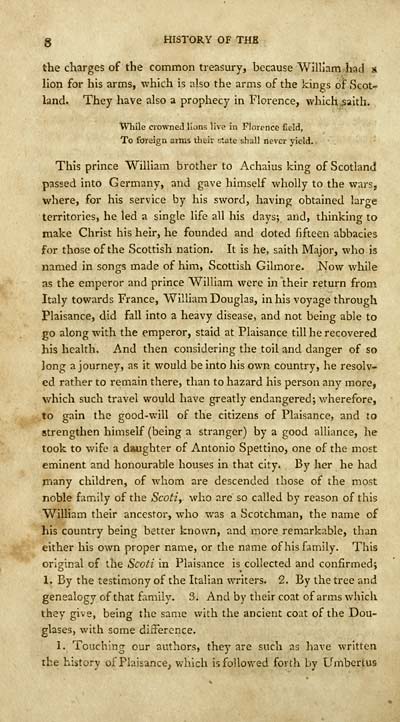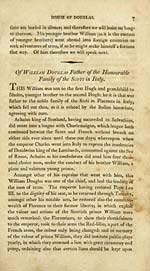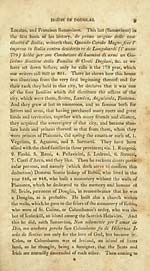Download files
Complete book:
Individual page:
Thumbnail gallery: Grid view | List view

g HISTORY OF THE
the charges of the common treasury, because William had s
lion for his arms, which is also the arms of the kings of Scot-
land. They have also a prophecy in Florence, which ,saith.
While crowned lions live in Florence field,
To foreign arms their state shall never yield.
This prince William brother to Achaius king of Scotland
passed into Germany, and gave himself wholly to the wars,
where, for his service by his sword, having obtained large
territories, he led a single life all his days; and, thinking to
make Christ his heir, he founded and doted fifteen abbacies
for those of the Scottish nation. It is he, saith Major, who i3
named in songs made of him, Scottish Gilmore. Now while
as the emperor and prince William were in their return from
Italy towards France, William Douglas, in his voyage through
Plaisance, did fall into a heavy disease, and not being able to
go along with the emperor, staid at Plaisance till he recovered
his health. And then considering the toil and danger of so
long a journey, as it would be into his own country, he resolv-
ed rather to remain there, than to hazard his person any more,
which such travel would have greatly endangered; wherefore,
to gain the good-will of the citizens of Plaisance, and to
strengthen himself (being a stranger) by a good alliance, he
took to wife a daughter of Antonio Spettino, one of the most
eminent and honourable houses in that city. By her he had
many children, of whom are descended those of the most
noble family of the Scoti r who are so called by reason of this
William their ancestor, who was a Scotchman, the name of
his country being better known, and more remarkable, than
either his own proper name, or the name of his family. This
original of the Scoti in Plaisance is collected and confirmed;
1. By the testimony of the Italian writers. 2. By the tree and
genealogy of that family. 3. And by their coat of arms which
they give, being the same with the ancient coat of the Dou-
glases, with some difference.
1. Touching our authors, they are such as have written
the history of Plaisance, which is followed forth by Umberjus
the charges of the common treasury, because William had s
lion for his arms, which is also the arms of the kings of Scot-
land. They have also a prophecy in Florence, which ,saith.
While crowned lions live in Florence field,
To foreign arms their state shall never yield.
This prince William brother to Achaius king of Scotland
passed into Germany, and gave himself wholly to the wars,
where, for his service by his sword, having obtained large
territories, he led a single life all his days; and, thinking to
make Christ his heir, he founded and doted fifteen abbacies
for those of the Scottish nation. It is he, saith Major, who i3
named in songs made of him, Scottish Gilmore. Now while
as the emperor and prince William were in their return from
Italy towards France, William Douglas, in his voyage through
Plaisance, did fall into a heavy disease, and not being able to
go along with the emperor, staid at Plaisance till he recovered
his health. And then considering the toil and danger of so
long a journey, as it would be into his own country, he resolv-
ed rather to remain there, than to hazard his person any more,
which such travel would have greatly endangered; wherefore,
to gain the good-will of the citizens of Plaisance, and to
strengthen himself (being a stranger) by a good alliance, he
took to wife a daughter of Antonio Spettino, one of the most
eminent and honourable houses in that city. By her he had
many children, of whom are descended those of the most
noble family of the Scoti r who are so called by reason of this
William their ancestor, who was a Scotchman, the name of
his country being better known, and more remarkable, than
either his own proper name, or the name of his family. This
original of the Scoti in Plaisance is collected and confirmed;
1. By the testimony of the Italian writers. 2. By the tree and
genealogy of that family. 3. And by their coat of arms which
they give, being the same with the ancient coat of the Dou-
glases, with some difference.
1. Touching our authors, they are such as have written
the history of Plaisance, which is followed forth by Umberjus
Set display mode to:
![]() Universal Viewer |
Universal Viewer | ![]() Mirador |
Large image | Transcription
Mirador |
Large image | Transcription
Images and transcriptions on this page, including medium image downloads, may be used under the Creative Commons Attribution 4.0 International Licence unless otherwise stated. ![]()
| Histories of Scottish families > History of the house and race of Douglas and Angus > (36) Page 8 |
|---|
| Permanent URL | https://digital.nls.uk/94874046 |
|---|
| Description | A selection of almost 400 printed items relating to the history of Scottish families, mostly dating from the 19th and early 20th centuries. Includes memoirs, genealogies and clan histories, with a few produced by emigrant families. The earliest family history goes back to AD 916. |
|---|

